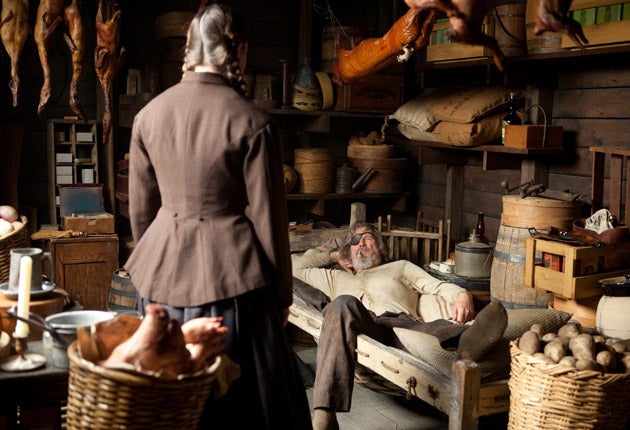True Grit (15): The IoS review

The Coen brothers' new Western begins with a verse from Proverbs – "The wicked flee when none pursues".
It's a line cited in Charles Portis's 1968 novel True Grit by 14-year-old heroine Mattie Ross, who – unknowingly modest – omits what follows: "but the righteous are bold as a lion". True Grit is about the bold righteous – and the not-so-righteous.
Portis's novel was filmed in 1969 by Henry Hathaway as a crowd-pleasing adventure starring John Wayne as grizzled, one-eyed Marshal Rooster Cogburn. Entirely losing the antique singularity of Mattie's narrative voice, and jokily if uncritically celebrating Wayne's persona as battle-scarred patriarch, Hathaway's film was a benign anachronism that could have been made in the 1940s.
The Coens' film is a fresh adaptation of Portis, rather than a remake of Hathaway. This is the brothers' most classically Hollywood production, and it pays due homage to the great Western canon. Yet, while the wilder, more mocking Coen eccentricities are absent, True Grit unmistakably bears their stamp in its deeply considered richness.
Significantly, the first sound you hear in True Grit is of wind – followed by Carter Burwell's music, stately with the tones of American hymnal. This is an august, wintry film. The opening shot, lit golden, reveals the body of Mattie's father; in voice-over, as an older woman, Mattie tells how he was shot by one Tom Chaney. Next, we see Mattie (newcomer Hailee Steinfeld) arriving in town to see her dead father and reclaim the cost of some horses he bought. In a priceless scene, Mattie persuades trader Stonehill (Dakin Matthews, terrifically droll) to take back his stock, beating him down by sheer cool-headed persistence. But Mattie has further business in mind – the pursuit of justice. She wants Chaney brought in, and chooses for the job the most ruthless candidate. He is drunken veteran Marshal Cogburn, played by Jeff Bridges as a teetering monument, with a voice like a bullfrog at the bottom of a well. Soon he and Mattie are joined in their pursuit by LaBoeuf (Matt Damon), a strutting Texas Ranger.
There are several pleasures to be had from the ensuing odyssey. One is the traditional Western thrill content, which the Coens whip up with gusto. It's all here: the horseback action, the shoot-outs, the slow-burn confrontations with the varmints Chaney (played by Josh Brolin as a whining Caliban) and Lucky Ned Pepper (Barry Pepper, a larky bit of Coen casting).
Another pleasure is the sense of epic that the Coens restore to Portis's story. This journey acquires a mythic edge as it heads into nightmare. The scene in which an outlaw has his fingers chopped off is truly horrifying, the brutality not played for black laughs as in the Coens' Fargo: you're aware that a child is witnessing this, the first stage of her initiation into the reality of violence. The Coens add their own strange episodes – such as the surreal arrival of a bear on horseback, which turns out to be an itinerant dentist (Ed Corbin) with the voice of a prairie Arthur Mullard.
Still another pleasure is the rivalrous verbal fencing between Cogburn and LaBoeuf – an enmity informed by their respective Civil War allegiances. In these arguments, Mattie plays referee, proving the one adult in the posse. It's notable that, while it ends up an action Western in the grand manner, True Grit is also unapologetically wordy. In a daringly extended courtroom scene, Cogburn is questioned about his habit of leaving a trail of dead, and replies with sangfroid – seasoned, that is, with rotgut and tobacco. The language throughout – much of it taken direct from Portis – is marvellously rich, whether in Cogburn's blustering pronouncements, Mattie's precocious Biblical diction, or the incidental archaisms, like Stonehill's declaration, "I do not entertain hypotheticals – the world as it is, is vexing enough."
The great thing about the film is that it's conceived not as a genre Western, but as a realistic narrative of 1870s America – the land of the James Gang, but also of Herman Melville. The men are Victorian in word and whisker, displaying an array of authentically untameable beards. The Coens' signature is visible in the physical presence of the characters: from Mattie, solemn in braids and oversized fedora, to LaBoeuf's over-abundance of buckskin. Bridges' Cogburn carries a Falstaffian heaviness; much of the greatness of the performance lies in the way he leans back in the saddle, like a mountain on the verge of subsidence.
The film is both rip-roaring and nail-biting, but it's also elegiac, as the best latterday Westerns have tended to be. The climax of Mattie's adventure is deeply moving – and be warned, you will sob for Little Blackie the pony as you have sobbed for no animal since Bambi. But the tale's ultimate meaning emerges in its sombre coda, in which we learn about Mattie's adulthood and realise the full import of her words, "You must pay for everything in this world one way or another."
Jeff Bridges is magnificent, his Rooster hilarious, but also menacing and pitiable, as John Wayne could never have imagined him. LaBoeuf calls himself "ever stalwart", and that's what Damon is here – in a support role that's as oafish as it is heroic. But it's the controlled intensity of young Steinfeld that carries the film: her steady-eyed Mattie is every bit a creature of the 1870s, though it's her defiance and her difference from her 21st-century peers that make her so compelling. It's largely her casting that makes True Grit the most formidable Western since Unforgiven. The Coens take the old terrain seriously, and that's why it's such a rattling pleasure – with grit and with gravity too.
Next Week:
Jonathan Romney reports from the Berlin film festival
Join our commenting forum
Join thought-provoking conversations, follow other Independent readers and see their replies
Comments
Bookmark popover
Removed from bookmarks